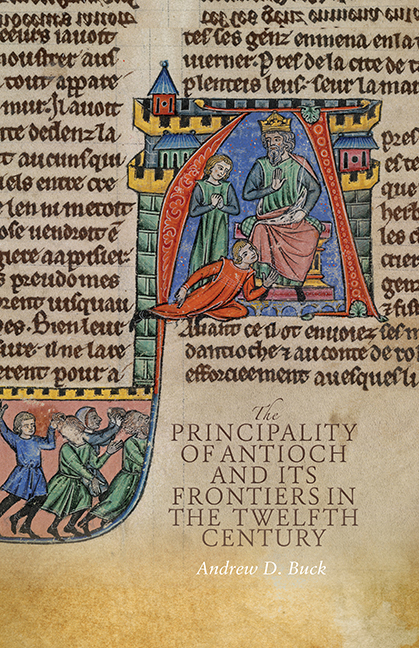Book contents
- Frontmatter
- Contents
- List of Maps
- Acknowledgements
- Abbreviations
- Introduction
- 1 The Extent of the Principality
- 2 The Rulers of Antioch
- 3 Central Governance and Military Service
- 4 Lordship in the Principality
- 5 A Frontier Society? The Nature of Intercultural Relations
- 6 Relations with Byzantium
- 7 Antioch and the Latin East
- Conclusion
- Bibliography
- Index
Conclusion
Published online by Cambridge University Press: 09 May 2017
- Frontmatter
- Contents
- List of Maps
- Acknowledgements
- Abbreviations
- Introduction
- 1 The Extent of the Principality
- 2 The Rulers of Antioch
- 3 Central Governance and Military Service
- 4 Lordship in the Principality
- 5 A Frontier Society? The Nature of Intercultural Relations
- 6 Relations with Byzantium
- 7 Antioch and the Latin East
- Conclusion
- Bibliography
- Index
Summary
As a result of modern trends in the fields of power, authority, frontiers and intercultural contact, a growing need has arisen to re-assess the history of the Latin East. The unique – and, at times, not so unique – challenges faced by the Frankish inhabitants of Outremer, due to their physical and social surroundings, provide significant insights into how Latin Christians interacted with their frontiers and neighbours. It has been argued here that this is especially so for the principality of Antioch, as the military, political and cultural pressures placed upon its rulers and settlers were of an intensity, and variety, unknown elsewhere in the medieval world. In response to this, the Frankish elites adopted the sort of fluidity of action also characteristic of western borderlands, with internal power structures and foreign policies shaped to meet the localised needs of security and stability. Although testament to the diversity of socio-political relationships which could emerge on medieval frontiers, that this has gone almost entirely unnoticed by historians demonstrates the need to re-examine Antioch's history.
An undoubted impetus for Frankish reactivity was the principality's fluctuating territorial extent. During the twelfth century, various strategic hotspots emerged which helped to shape the balance of power and the strategies pursued by Antioch's ruling elites. This was influenced, first and foremost, by the increased external scrutiny exerted on the principality after Bohemond II's death in 1130, as well the declining vigour with which princes were able to recover lost territory. As Zengid power on the eastern frontier developed, therefore, earlier attempts at isolating and subduing Antioch's nearest threat, the city of Aleppo, began to falter, and Frankish power east of the Orontes diminished. This was compounded by large-scale reverses, such as Inab in 1149 and Artah in 1164, as well as the rise of the Ayyubids under Saladin, whose devastating invasion in 1188 reduced the principality to its capital and immediate environs. This final loss did not entirely preclude Frankish military or political activity, but it was now severely inhibited. Coupled to this were evolving relations with the Christian powers of Byzantium and Armenian Cilicia, with both serving as allies and enemies at various points – a complication unique to Antioch in Outremer.
- Type
- Chapter
- Information
- Publisher: Boydell & BrewerPrint publication year: 2017



